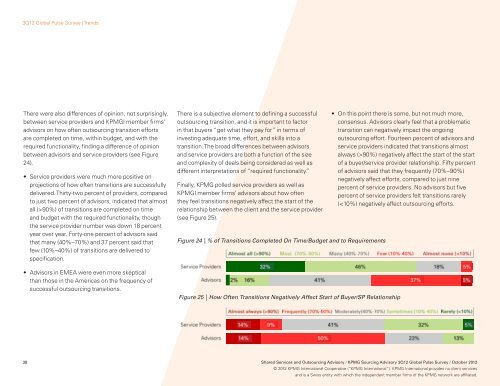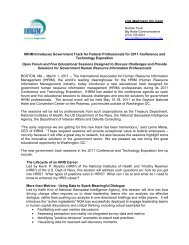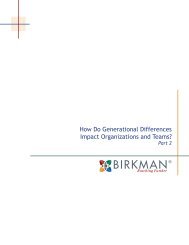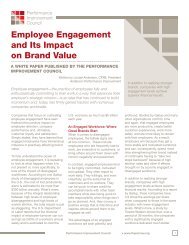KPMG Sourcing Advisory 3Q12 Global Pulse Survey - KPMG Institutes
KPMG Sourcing Advisory 3Q12 Global Pulse Survey - KPMG Institutes
KPMG Sourcing Advisory 3Q12 Global Pulse Survey - KPMG Institutes
Create successful ePaper yourself
Turn your PDF publications into a flip-book with our unique Google optimized e-Paper software.
<strong>3Q12</strong> <strong>Global</strong> <strong>Pulse</strong> <strong>Survey</strong> | Trends<br />
There were also differences of opinion, not surprisingly,<br />
between service providers and <strong>KPMG</strong>I member firms’<br />
advisors on how often outsourcing transition efforts<br />
are completed on time, within budget, and with the<br />
required functionality, finding a difference of opinion<br />
between advisors and service providers (see Figure<br />
24).<br />
• Service providers were much more positive on<br />
projections of how often transitions are successfully<br />
delivered. Thirty-two percent of providers, compared<br />
to just two percent of advisors, indicated that almost<br />
all (>90%) of transitions are completed on time<br />
and budget with the required functionality, though<br />
the service provider number was down 18 percent<br />
year over year. Forty-one percent of advisors said<br />
that many (40%–70%) and 37 percent said that<br />
few (10%–40%) of transitions are delivered to<br />
specification.<br />
• Advisors in EMEA were even more skeptical<br />
than those in the Americas on the frequency of<br />
successful outsourcing transitions.<br />
There is a subjective element to defining a successful<br />
outsourcing transition, and it is important to factor<br />
in that buyers “get what they pay for” in terms of<br />
investing adequate time, effort, and skills into a<br />
transition. The broad differences between advisors<br />
and service providers are both a function of the size<br />
and complexity of deals being considered as well as<br />
different interpretations of “required functionality.”<br />
Finally, <strong>KPMG</strong> polled service providers as well as<br />
<strong>KPMG</strong>I member firms’ advisors about how often<br />
they feel transitions negatively affect the start of the<br />
relationship between the client and the service provider<br />
(see Figure 25).<br />
Figure 24 | % of Transitions Completed On Time/Budget and to Requirements<br />
Figure 25 | How Often Transitions Negatively Affect Start of Buyer/SP Relationship<br />
• On this point there is some, but not much more,<br />
consensus. Advisors clearly feel that a problematic<br />
transition can negatively impact the ongoing<br />
outsourcing effort. Fourteen percent of advisors and<br />
service providers indicated that transitions almost<br />
always (>90%) negatively affect the start of the start<br />
of a buyer/service provider relationship. Fifty percent<br />
of advisors said that they frequently (70%–90%)<br />
negatively affect efforts, compared to just nine<br />
percent of service providers. No advisors but five<br />
percent of service providers felt transitions rarely<br />
(

















